 From most of my tart comments to date it must seem to the casual observer that I've got a total downer on music from the fifties. Not so. There are any number of singles from the era that I love and cherish with their only fault being that they stalled short of the number one spot (considerably short in some cases, it has to be said). Those songs that did make it to the peak thus far have for the most part fallen down through trying too hard; too sentimental, too earnest, too fussy, too overwrought and too emotionally overloaded - all they've managed to do is create an overmade, overdone and overdressed approximation of what I'd call a 'pop' song, much like Danny La Rue going overboard with the slap and frocks to the extent that he could only ever be seen as a man in a dress. In other words, the exact opposite of what he set out to achieve, (albeit intentional in Danny's case).
From most of my tart comments to date it must seem to the casual observer that I've got a total downer on music from the fifties. Not so. There are any number of singles from the era that I love and cherish with their only fault being that they stalled short of the number one spot (considerably short in some cases, it has to be said). Those songs that did make it to the peak thus far have for the most part fallen down through trying too hard; too sentimental, too earnest, too fussy, too overwrought and too emotionally overloaded - all they've managed to do is create an overmade, overdone and overdressed approximation of what I'd call a 'pop' song, much like Danny La Rue going overboard with the slap and frocks to the extent that he could only ever be seen as a man in a dress. In other words, the exact opposite of what he set out to achieve, (albeit intentional in Danny's case).In logically following my own interpretation, 'pop' should be more subtle, more Thai ladyboy than drag queen if you like. But see, I can't blame the songs for not falling in line with my own definition of what a number one should be all about can I? These early hits were 'pop' as in 'popular', and when you've spent eighteen weeks at number one then your popularity simply can't be denied. By that definition at least, they are all pop songs par excellence
But in writing all this, I'm not trying to be some xenophobic tourist in a foreign land complaining loudly about everything from the food to the weather to the fact the roadsigns are in a different language - there's an element of archaeology involved here too, a cultural timeline to excavate that reveals this thing called 'pop' was slowly morphing into something more than just an abbreviation. Listening to 'Secret Love', I get the same feeling that Robinson Crusoe must have got the first time he spotted Man Friday's footprint in the sand; at last, there's something familiar here in the wilderness, something comforting that makes me feel less of an illegal alien amongst Guy Mitchell and the gang. Not perfect, by no means perfect, but 'Secret Love' has, via its arrangement and performance, a lightness of touch and a genuineness born of confidence that you won't get from a facefull of mascara and lipstick pasted on with a trowel.
In modern parlance, 'Secret Love' is probably best know through the upbeat version that Kathy Kirby cut in 1963 and hearing Day's more languid take can wrong foot the unwary. Kirby's shout slants the 'secret' until it implies all manner of adulterous wrongdoing (there's also a gay angle that's frequently exploited with the 'secret' being equated to the 'love that dare not speak its name'). True, this can be read into the current version too, but taken solely in context in which Day is performing it (the musical 'Calamity Jane' at a point where Jane/Day is out of town and musing over Wild Bill Hickcock), then that little bit of knowledge comes loaded with the potential to kill all this stone dead.* But thankfully, 'Secret Love' is a strong song. Strong enough to shrug off such ridiculous baggage anyway.
Day's voice helps enormously in all this; hardwired with a smile, it's all natural and effortless when compared to the company it's keeping in these charts. Never stiff or formal, when Day soars (as she does on "Now I shout it from the highest hills") then it's because she means it and not simply because the arrangement calls for a bit of oomph. Yes the song is still heavy on the soup of soppy balladry, but the orchestration is light enough to give Day the room to breath that she needs to do her thing, and in so doing she gives 'Secret Love' a modern veneer that wouldn't sound too out of place in today's charts.
Any number of X Factor wannabes could pitch up with this at audition, and in 1954 it was like placing a modern racing bike in a line-up of Penny Farthings. Whilst undoubtedly ahead of it's time, 'pop' music was quick to catch up and overtake it, but not to pull so far ahead as to leave it out of sight in the rear view mirror and languishing in the dirt. Which is the fate that's befallen much of what's gone before us so far.
* And if you've seen the scene from the movie where a pristine white toothed and freshly scrubbed up Day sings it on horseback in a Technicolor Wild West that looks more like the Wonderful World Of Oz than the land that Calamity Jane/Robin Weigert rode in the hyperealistic 'Deadwood,' then that death will come all the quicker.
No comments:
Post a Comment